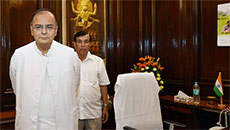On the seventh day of the Ayodhya hearing, the Hindu parties cited evidence based on an archaeological report to state that there was a massive structure at the Babri Masjid site dating back to the 2nd century BC which was public in nature and that the structure would be a temple or 'mandap' with pillars.
A Constitution bench headed by Chief Justice Ranjan Gogoi is conducting the hearing on the vexed Ayodhya dispute.
Senior advocate C.S. Vaidyanathan, appearing for Ram Lalla Virajman, informed the court that the archaeological study was carried out at the disputed site where the Babri mosque was demolished by a mob in December 1992.
The archaeological report concluded that various structures were found in various layers during the excavation.
For example, a passage to drain excess water resulting from the 'abhishek' of the deity was found.
The senior counsel informed the court about the stratigraphy methodology deployed by the archaeologists to identify the remains from the previous civilization which indicate a massive structure of public status existed which could be used by a large number of people especially for worship. This was absolutely different from a structure meant for private use.
"Besides the pottery, broken figure in terracotta, round vessel with legion... The oldest northwest black polish level (had) Ashokan Brahmi script," argued the counsel, establishing that there have been structures from the 2nd and 3rd century BC that point to religious structures at the disputed place.
Vaidyanathan also informed the bench that the imagery and sculptures within the structure (Babri Masjid) established that it was not a mosque as such expression of imagery was not usually seen in mosques.
Merely because Muslims prayed there does not give them ownership over it, he contended.
Vaidyanathan also referred to sculptures on the structural pillars, which he said had images of Garuda flanked by lions. He contended that such imagery was completely in contrast to Islamic practices as they have no images of any human or animal in a mosque.
Vaidyanathan referred to the Archaeological Survey of India (ASI) report suggesting that the remains excavated were from a large structure with a lot of pillars and columns. He said that this structure was open to the public.
Citing the report, the counsel also said that there were several pictures of deities found on pillars of the massive structure.
The senior lawyer also read out the report of the commissioner, who was appointed to inspect the site, which suggested presence of pillars with images of Lord Shiva. The site was inspected by the court commissioner on April 16, 1950.
Stressing that the massive structure was from the 2nd century BC, the senior counsel said that over centuries there have been many additions to it.
He said that the structure was not a simple building and opined that materials found through excavation indicate that it was a temple.
"The probability would indicate it was for Lord Ram as the belief that it is Ram Janmabhoomi," the senior lawyer said.
He also mentioned the expert opinion of Professor Nagaswamy of ASI who has denied the theory that a Buddhist monument may have existed at the site.
He also said that the mosque was built on this structure on the instructions of Mughal emperor Babur.
"The mosque was not built on a vacant land or an agricultural land but on a land where a structure existed which dates back to 2nd century BC," Vaidyanathan told the court.
Justices S.A. Bobde and D.Y. Chandrachud asked Vaidyanathan to give evidence that if there was a structure, it was a religious one as it observed that all civilisations have thrived on the banks of rivers.
Responding to the bench's query, Vaidyanathan referred to the ASI reports and reiterated that there existed a massive structure which was also open to the public and it would mean that such a structure was a temple.
Justice Chandrachud also raised a point that a grave was also found at the disputed site during the excavation and asked the opinion of the senior counsel on the existence of the grave.
Vaidyanathan responded that the archaeologists have also held that the grave was added many decades later than the old ruins.
Vaidyanathan also told the bench that the structure was never in the true sense considered a mosque and offering prayers at the disputed Ayodhya site does not give Muslims the right to lay claim over it.
"Just because prayers are being offered on a street (by Muslims) doesn't mean a claim of ownership over it can be made," Vaidyanathan said.

